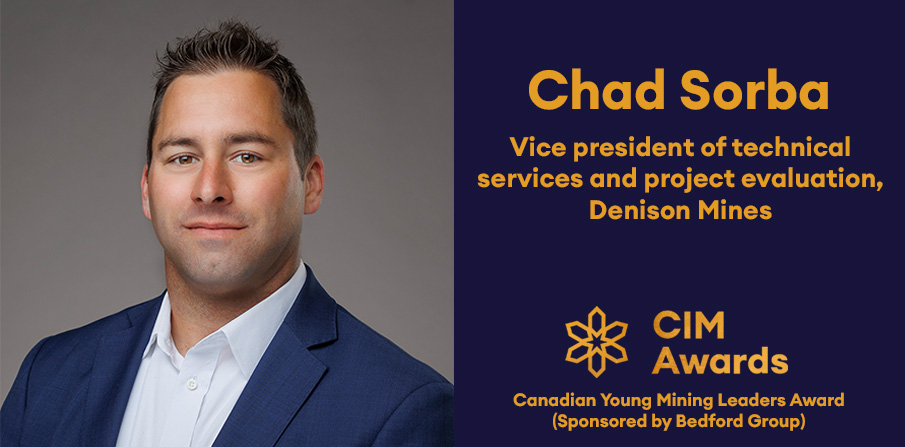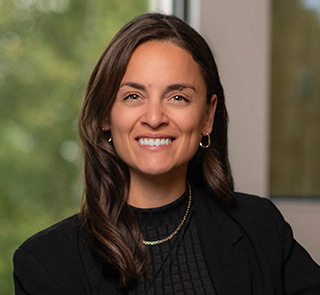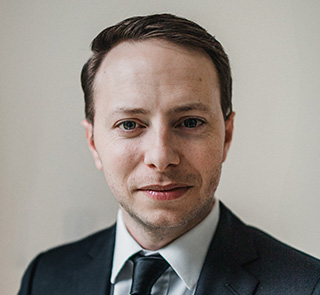By Tijana Mitrovic - 15 May 2025
Meet Chad Sorba: A Canadian Young Mining Leader Award-winner making an impact on the industry
When Chad Sorba was in university, he was still unsure what career path his post-secondary studies would take him down. He took a friend’s advice and enrolled in an introductory geology class. “I took that course and I did really well in it and I also enjoyed it,” he said. “It was one of those things that came naturally to me. I found my niche.”
After graduating from the University of Saskatchewan with a Bachelor of Science Honours in Geological Sciences, he settled into that niche at Denison Mines, where he has spent nearly 20 years working across different teams. Joining as a geologist in 2008, Sorba started in the company’s exploration group, focused on the Athabasca Basin in northern Saskatchewan.
At Denison, he has been involved in several discoveries, including the high-grade Phoenix uranium deposit in 2008. Sorba was also engaged in project assessment for the company’s previously held uranium projects in Asia, Africa and the U.S., where he gained exposure and experience with projects on both the exploration and the mining front. In 2017, Sorba moved to Denison’s technical services group, where he focused on helping develop new mining methods and extraction processes.
Sorba has been involved with the company’s Phoenix uranium deposit, in the Athabasca Basin region in northern Saskatchewan, throughout his time at Denison. He helped with the completion of the project’s pre-feasibility study in 2018, which put forward in-situ recovery (ISR) as the mining method for the project.
“When we were finished delineating it, the Phoenix deposit was the world's highest-grade uranium deposit at the time…but it wasn't the biggest,” Sorba said. “So when we looked at the economics it was a marginal or break-even project using conventional mining methods. But we didn't want to accept that—how can the world's highest grade uranium deposit not be economic? So we said, if you can't grow it in size, you need to change how it's mined.”
To manage that change, Sorba led a series of de-risking programs where the company conducted several in-ground assessments, installed Canada’s first commercial-scale in-situ recovery (ISR) test well for uranium and culminated with a feasibility field test where uranium bearing solution was ultimately extracted.
The Phoenix uranium project is on track to become the first ISR uranium mine in Canada, which the team at Denison believes will be an economic and sustainability game-changer for uranium mining in Saskatchewan. Sorba is also looking to see if ISR mining can be used at other Denison projects.
Sorba has engaged with regulators, investors, and both Indigenous and non-Indigenous communities, explaining proposed mining operations clearly to drive project development. Coming from a technical background, Sorba said that community engagement has been an eye-opening experience for him. “A lot of that work is hands-on with people, having one-on-one conversations,” he explained. “It's less of the boardroom-style PowerPoint presentation mode, it's about actually talking to people, being genuine and explaining the process in a different way. That was probably one of the most rewarding things: getting to a different level than I was used to and really working one-on-one.”
Sorba also regularly guest lectures at the University of Saskatchewan and speaks at key industry events such as the PDAC and CIM conventions, and is actively involved in the local community, supporting initiatives like the Saskatchewan Soccer Association and participating in local fundraising efforts.
As the development of the Phoenix deposit continues to ramp up, Sorba says he feels fortunate to have been involved in its initial discovery. “We're probably about a year or so out from constructing and maybe two and a half years out from producing,” he explained. “That is the next thing I'm really looking forward to: seeing the ore come out of the ground and saying I was part of it from the start.”
 - dev.png)





